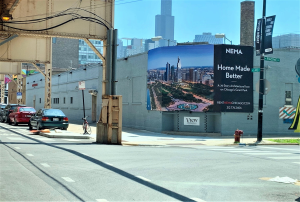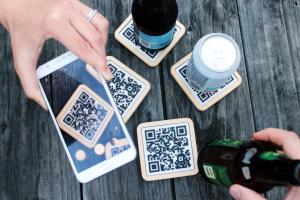Bus bench advertising has long been a staple of out-of-home (OOH) advertising, providing high visibility in areas with heavy foot traffic, commuters, and passersby. Traditionally, these ads have been static, relying on bold visuals and clear messaging to capture attention. However, as technology continues to evolve, so does the potential of bus bench advertising. By integrating QR codes and augmented reality (AR), brands can transform these simple advertising platforms into highly interactive and engaging experiences.
In this blog, we’ll explore how QR codes and AR can elevate bus bench advertising, delve into the psychology behind interactive advertising, and highlight practical examples of successful campaigns. We’ll also discuss how Adzze can help brands innovate their bus bench advertising strategies for maximum impact.
The Shift Toward Interactive OOH Advertising
In the digital age, consumers expect more than just static advertisements. They seek interactivity, personalization, and experiences that engage their curiosity. Traditional OOH advertising, while effective in visibility, often lacks the ability to provide immediate interaction. Integrating QR codes and AR bridges this gap, creating opportunities for consumers to engage with brands on a deeper level.
The Role of QR Codes in Modern Bus Bench Advertising
1. Bridging Physical and Digital Worlds
QR codes are powerful tools that connect physical advertisements with digital platforms. When scanned using a smartphone, a QR code can direct users to a variety of digital destinations, such as:
– A promotional landing page.
– A video demonstrating a product or service.
– A coupon or discount offer.
– A sign-up form for newsletters or events.
For bus bench ads, QR codes allow brands to create a seamless transition from passive observation to active engagement.
2. Enhancing Personalization
One of the significant advantages of QR codes is their ability to deliver personalized content. By linking QR codes to geo-targeted or audience-specific landing pages, brands can provide contextually relevant offers or information. For instance, a restaurant can display a QR code on a bus bench near its location, offering a discount to commuters during lunchtime.
3. Measuring Engagement
QR codes provide measurable insights into consumer behavior. Brands can track how many people scan the code, where they are scanning from, and what actions they take after scanning. This data helps marketers evaluate the effectiveness of their campaigns and refine future strategies.
Example Campaign:
A fitness brand placed QR codes on bus benches near gyms, linking to a free trial offer. The campaign resulted in a 30% increase in trial sign-ups within the first month.
Augmented Reality: Taking Bus Bench Advertising to the Next Level
AR technology superimposes digital elements onto the real world, creating immersive experiences that captivate audiences. By incorporating AR into bus bench advertising, brands can ordinary benches into interactive storytelling platforms.
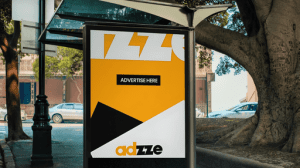
1. Creating Immersive Brand Experiences
AR allows consumers to interact with advertisements in unique ways. For example, a bus bench ad for a travel agency could feature a QR code that, when scanned, launches an AR experience showing a 360-degree view of a tropical destination.
2. Encouraging Social Sharing
AR experiences are inherently shareable. When consumers encounter something novel and engaging, they are more likely to capture it on their phones and share it on social media. This amplifies the campaign’s reach and generates organic buzz.
3. Aligning with Consumer Curiosity
AR satisfies the innate human desire to explore and discover. Ads that incorporate AR elements encourage users to spend more time interacting with the brand, leading to stronger recall and emotional connection.
Example Campaign:
A cosmetics brand used AR in a bus bench ad to let users virtually try on different lipstick shades. By scanning the QR code, consumers could see how the colors looked on their faces using their phone cameras. This interactive experience drove a 25% increase in store visits.
Psychology of Interactive Advertising
Understanding why QR codes and AR are effective requires a look into consumer psychology:
1. The Power of Curiosity
Humans are naturally curious. QR codes and AR experiences tap into this curiosity by offering an element of surprise or novelty. Consumers are more likely to engage with ads that pique their interest or promise something unique.
2. Memory Retention Through Interaction
Interactive ads are more memorable because they require active participation. When consumers engage with an ad—whether by scanning a QR code or interacting with AR elements—they are more likely to remember the brand and its message.
3. Emotional Engagement
AR experiences, in particular, evoke emotions by immersing users in a different reality. Whether it’s excitement, joy, or awe, these emotions strengthen the consumer’s connection to the brand.
Practical Applications of QR Codes and AR in Bus Bench Advertising
1. Retail Promotions
Retailers can use QR codes on bus benches to direct consumers to limited-time offers or product launches. For example, a clothing brand could promote a new collection by linking the QR code to an exclusive online preview.
2. Event Marketing
Event organizers can use QR codes to provide details about upcoming events, such as concerts or festivals. Scanning the code could offer users a chance to purchase tickets, view event schedules, or access AR previews of the venue.
3. Community Engagement
Local governments or non-profits can use QR codes on bus benches to promote community programs or initiatives. For instance, a QR code could lead to information about recycling programs or volunteer opportunities.
4. Product Demonstrations
Brands selling complex or innovative products can use AR to demonstrate their features. A furniture brand, for example, could let users visualize how a piece would look in their living room through an AR experience.
5. Tourism Campaigns
Tourism boards can use AR to create interactive experiences that showcase local attractions. A bus bench ad in a historic district could feature a QR code that launches an AR tour of the area’s landmarks.
How Adzze Innovates Bus Bench Advertising
Adzze specializes in unconventional advertising solutions that elevate traditional formats like bus bench ads. By incorporating QR codes and AR, Adzze helps brands create impactful campaigns that resonate with modern consumers.
1. Seamless Integration
 Adzze ensures that QR codes and AR elements are seamlessly integrated into the design of bus bench ads, maintaining aesthetic appeal while enhancing functionality.
Adzze ensures that QR codes and AR elements are seamlessly integrated into the design of bus bench ads, maintaining aesthetic appeal while enhancing functionality.
2. Customization
Adzze works with brands to create tailored AR experiences and QR code campaigns that align with their goals and target audience.
3. Measurable Results
With advanced analytics tools, Adzze provides insights into the performance of QR code and AR campaigns, helping brands optimize their strategies.
Click Here to see our Media Options
Case Studies: Success Stories
Integrating QR codes and augmented reality (AR) into bus bench advertising has transformed static displays into interactive experiences, enhancing consumer engagement and brand recall. Several real-world campaigns have successfully leveraged these technologies to create memorable and effective advertisements.
1. Pepsi Max’s ‘Unbelievable’ Bus Shelter Campaign
In 2014, Pepsi Max executed an innovative AR campaign at a bus shelter on New Oxford Street in London. The side panel of the shelter, appearing as a transparent window, was actually a digital screen that overlaid extraordinary scenarios onto the real-world view. Commuters were astonished by scenes such as a meteorite crashing, a tiger prowling, and a giant robot invasion. This campaign not only captivated the public but also achieved significant results:
2. IKEA’s ‘Buy Back’ QR Code CampaignIKEA implemented a QR code campaign as part of its ‘Buy Back’ program, encouraging customers to return used furniture in exchange for incentives like discounts or vouchers. By scanning the QR codes, customers accessed detailed information about the program, facilitating a seamless and engaging experience. This initiative not only promoted sustainability but also enhanced customer engagement and brand loyalty.
3. NikePlus QR Code Engagement Campaign
Nike’s QR code campaign for its NikePlus program exemplifies effective use of mobile barcodes to engage customers. By scanning QR codes on products or in-store displays, customers unlocked personalized experiences and accessed additional features on the Nike app. This strategy increased customer engagement and improved brand loyalty, motivating users to continue using the app for its unique benefits.
4. Burger King’s VMA Whopper QR Code Campaign
Burger King launched a QR code campaign during the Video Music Awards (VMA), featuring rapper Lil Yachty alongside the brand’s mascot. A QR code was displayed on-screen, which viewers could scan to receive a free burger offer via the Burger King mobile app. This innovative strategy enhanced customer interaction and drove sales growth through app engagement.
5. Chipzskut Product Display Improvement Campaign
Chipzskut, a snack brand, utilized QR codes in their product displays to provide consumers with instant access to information about the product, such as ingredients and nutritional facts. This approach created a frictionless consumer experience and added value for potential customers, demonstrating the effectiveness of QR codes in marketing strategies.
These case studies illustrate the potential of integrating QR codes and AR into bus bench and bus shelter advertising to create engaging, memorable, and effective marketing campaigns. By leveraging these technologies, brands can bridge the gap between physical advertisements and digital engagement, providing consumers with interactive experiences that enhance brand recall and drive sales.
The Future of Bus Bench Advertising
By integrating QR codes and AR, bus bench advertising can evolve from static displays into dynamic, interactive platforms that engage, inform, and entertain. This shift not only enhances consumer experience but also provides measurable results for brands.
Ready to transform your bus bench advertising? Watch our video below to see how Adzze can help you integrate QR codes and AR into your campaigns. Contact us today to request a media kit and start creating impactful, interactive advertising strategies.

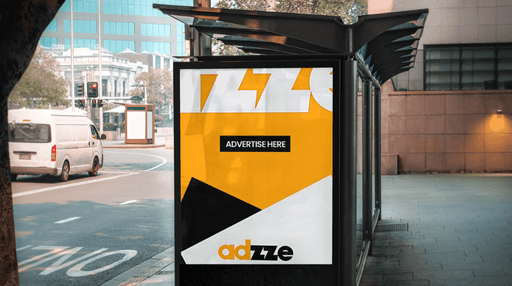
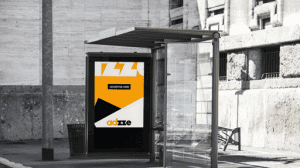 Adzze ensures that QR codes and AR elements are seamlessly integrated into the design of bus bench ads, maintaining aesthetic appeal while enhancing functionality.
Adzze ensures that QR codes and AR elements are seamlessly integrated into the design of bus bench ads, maintaining aesthetic appeal while enhancing functionality.